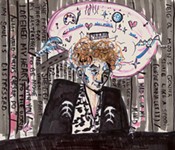Pages as Presents
2001's crop of coffeetable books
By Shawn Badgley, Fri., Dec. 7, 2001

Jerome Charyn's Ping-Pong: Much More Than Sport
More an anecdotal memoir than the sleek, charming coffeetable book blessed with beautiful vintage photographs that it first appears to be, Sizzling Chops & Devilish Spins: Ping-Pong and the Art of Staying Alive (Four Walls Eight Windows, $24) is the work of a devoted pongiste who has played the sport since the age of 10. But it's also the work of an aging intellectual. Jerome Charyn, now in his mid-60s and the author of more than 30 books, melds medical science's varied opinions on the risks and rewards of geriatric Ping-Pong with the solace of reminiscing about the cloistral Manhattan gambling parlors of its golden era. And somewhere in the overwhelming yet controlled roar of his clipped, contemporary American prose, Charyn has founded a past. It didn't come from just anywhere, of course: Among his most crucial sources for Sizzling Chops & Devilish Spins is Tim Boggan, former United States Table Tennis Association president, USA Table Tennis editor, author of Ping-Pong Oddity, and "the guy who has all of Ping-Pong history inside his head."
But Ping-Pong's past is something altogether different. It's a story, a ballad, an extravagant stage play whose countless scenes have been acted out for two centuries and whose dramatis personae includes kings and con men, rock stars and clowns, junkies, geniuses, and legendary matadors gored on their own anonymity. Charyn handles this ripe past with his pen like he would a "fat," weakly spinning 40mm Ping-Pong ball with his picot: He lunges at it. He laments the soullessness of modern-day Ping-Pong -- namely, the revolutionary "sponge" sandwich racket introduced in 1952 by Japanese watchmaker Hiroji Satoh and the dearth of personalities and rivalries -- while profiling the likes of Marty "the Needle" Reisman, the flamboyant "born entertainer," and Dick Miles, "the sphinx of American Ping-Pong," neither of whom would ever win the world singles championship.
Charyn's -- and his surviving subjects' -- bitterness at the slow, inglorious death of U.S. Ping-Pong, at times nothing but sour grapes that stink up this otherwise bracing book, is tempered by the fact that the author lives in Paris, knows the sport's worldwide reputation, and remains in touch with European stars like Michael French. Likewise, his adroit analysis of 1971's U.S.-China "Ping-Pong Diplomacy" and the technical expertise he brings to and from the table counters his often self-aggrandizing, hyperbolic sentences -- he calls himself "one more Billy the Kid, a left-handed gun" and writes of a young opponent: "He had nothing to assuage the grief of having lost ... to old Methuselah. His little gods had failed him, gods who'd never failed him before." Regardless, Charyn doesn't fail here, as Sizzling Chops manages to be much more than the sport and nothing but the sport at the same time, and with the same offbeat intensity.








